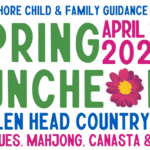Having a baby can be the happiest time in a woman’s life. But for many, new motherhood can also bring risk of an increase in existing depression or the occurrence of new depression.
In a recent report on maternal depression and economic mobility released by the Brookings Institution, author Richard V. Reeves states that “about 10 to 20 percent of mothers will be depressed at some time during their lives, and one in 11 infants will experience their mothers’ perinatal depression.”
Mental health experts agree that constancy of relationships from early childhood is the single most reliable predictor of positive outcomes in later life. Promoting safe and warm relationships with parents and other caregivers is an important factor in young children’s healthy development, later success in school and prevention of intergenerational transmission of poverty and lack of economic mobility.
One young mother who was recovering from postpartum depression at North Shore Child & Family Guidance Center brought her depression to life at a public event hosted by the Guidance Center. As she recalled, “I could barely lift my head off my pillow, let alone lift and hold and cuddle and care for my baby.”
Studies reveal that mothers who are poor are more likely to experience depression. When a primary caregiver (most often the mother) is depressed, it is difficult to make a positive connection with her baby or toddler, which is likely to negatively impact the child’s development. Of course, postpartum depression can strike any woman regardless of her socioeconomic status, but it can be especially difficult for people struggling to survive financial woes.
At the same time, developing the skills, confidence and aspirations needed to transcend living in poverty are byproducts of strong early bonding.
So, if poverty, poor mental health, compromised child development and worse outcomes are likely factors contributing to perpetuation of poverty, what can be done to break the cycle?
According to the Brookings report, the goals of policies necessary to intervene in breaking the cycle are: (1) Reduce poverty; (2) Reduce the impact of poverty on depression among caregivers; (3) Reduce the impact of caregiver depression on early child development; and (4) Reduce the impact of weaker early child development on later outcomes.
The Center of Disease Control in Atlanta administered a project aimed at identifying maternal depression early on. Two questions that they asked moms were: 1) Since your new baby was born, how often have you felt down, depressed, or hopeless?; and 2) Since your new baby was born, how often have you had little interest or little pleasure in doing things?
The women who answered “often” or “always” to either question were classified as experiencing self-reported postpartum depressive symptoms. Detecting the problem is the first step in getting moms and their families the help they need.
One thing we can do to help to break the cycle is to encourage primary care physicians and other health professionals to incorporate screening tools into their encounters with pregnant women and mothers of infants.
The American Congress of Obstetricians and Gynecologists recommends that clinicians screen patients at least once during the perinatal period for depression and anxiety symptoms using a standardized, validated tool. Screening should be coupled with appropriate follow-up and treatment when indicated.
The American Academy of Pediatrics recommends that a woman experiencing negative feelings about her pregnancy should receive additional support from the health care team. She should be monitored for symptoms of severe postpartum depression and offered culturally appropriate treatment or referral to community resources.
They also recommend ongoing assessment soon after hospital discharge. Monitoring for continuing or worsening symptoms should occur from four to six weeks after delivery, including a review of symptoms for clinically significant depression to determine if intervention is needed.
Healthy attachments are not about children getting what they want, but getting what they need — the assurance that an adult caregiver is by their side, looking out for them, teaching them how to manage their own feelings, and learning about the give and take of relationships. All children deserve this, regardless of their family’s socioeconomic status.
If you or your loved one is a caregiver of an infant or toddler and are experiencing symptoms of depression or anxiety, ask for the Diane Goldberg Maternal Depression Program at North Shore Child & Family Guidance Center at 516-484-3174. If there is a teenage girl in your family who is pregnant or parenting an infant child, ask for the Good Beginnings for Babies Program, also at the Guidance Center, at 516-997-2926. We turn no one away for inability to pay.
Andrew Malekoff is the executive director of North Shore Child & Family Guidance Center, which provides comprehensive mental health services for children from birth through 24 and their families.














